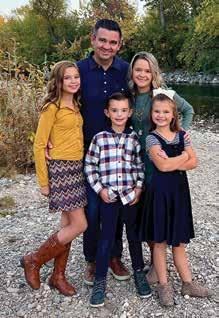










me
I am frightened by world
But
realize that these
as if












me
I am frightened by world
But
realize that these
as if
Ten years. Really?! What a miracle and a blessing to get to do what I do. I’m forever touched that you would continue to invite us into your lives.
Over the course of time I have been privileged to share much of my life and my testimony with you, our readers. I am always deeply touched when I meet a reader and am told “I’ve been praying for you.” I may not know you personally, but please know my team and I feel every one of your prayers, and we thank you!
As Christians we marvel at how Jesus chose fishermen and a tax collector to change the world.
We’re awestruck as we read the accounts of the woman caught in adultery, or the woman with the issue of blood, and Jesus healing the lame man at the pool of Bethesda.
Sometimes we get so accustomed to these stories that they lose their full impact.
One thing these events all have in common – the choosing of the twelve disciples, and subsequent miracles – is how Jesus chose, and worked through, “the least of these.”


It’s easy to fall into believing that this ageold history was the only time Jesus did these things.
I am living proof that that is simply not true.
A genuine, awkward nerd in school, and clumsy as can be, I was often an outcast. A single mom at 19; then married and divorced by 29, followed by a series of poor choices and bad decisions. It wasn’t until my husband, Steve, suggested we find a church and get our lives together back in August of 1996 that I found solid ground.
Oh there were lies I told myself about God and Jesus. The deeper the guilt and shame; half-truths and mis-told lessons were revealed and peeled away like the layers of an onion. The more I learned, the deeper I fell in love with our Lord and Savior, and the easier it was to believe that He loves me; even more importantly that He has always loved me.
In so many ways, I am one of “the least of these,” and yet, He called me into this ministry, and has blessed me with the skills needed to fulfill His calling.
As we have prepared to celebrate Christian Living’s 10th anniversary, much of our team has shared how this journey, this incredible calling, has impacted their lives. No one is more surprised than we are that 11 years after this was just a concept, we’re still here.
I remember sending the first issue off to the printer, saying to our editor, Gaye, ‘who knows how long this will last – perhaps we’re just meant to touch one life and when we’ve accomplished that God may close this door,’ and we were both good with that. We still are today.
Over the last 10 years Christian Living has grown and changed. Changed owners. Changed from being an LLC to incorporating and becoming a 501c3 non-profit ministry.
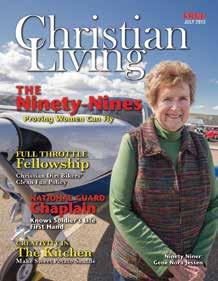


We’ve added a website that reaches readers in more than 150 countries around the world. In October of 2020 Christian Living Spotlight, our radio show was birthed, right in the middle of the pandemic, and earlier this year we were thrilled to announce that Christian Living Spotlight is now also a podcast and is available on most major streaming services.
Eleven years ago we believed that this magazine was going to be a sweet little community niche publication to encourage our fellow believers here in the Treasure Valley. We had no idea about the wild ride God had in store for us. If He’d shown us the entire picture then, I think we’d have all run off scared to death of failure.
We still don’t know God’s full plan for Christian Living Ministries, but we do know we’re all dedicated to continue saying “here I am Lord, use me,” and we are so grateful you have decided to join us!
A huge thank you has to go out to all of our advertisers and donors! Without them we would not exist – there would be no magazine, website, radio show or podcast. I know I say this often, but please frequent our advertisers as much as you can, and thank them for their support of Christian Living – our mission is as important to many of them, as it is to us!
We thank you dear reader for trusting us, encouraging us, and supporting us as we go forward into this blessed calling to serve our Wonderful Lord and Savior.
Until next time…
God Bless! n


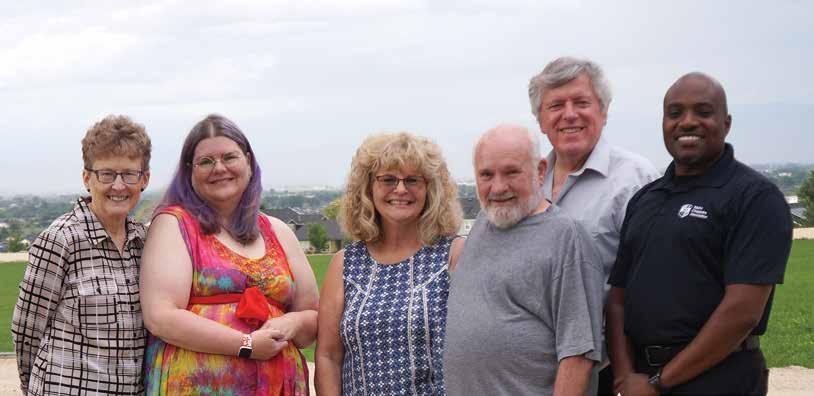


In John 15:5, Jesus uses the metaphor of a vine and its branches to describe the relationship between Him and His followers. Speaking to His disciples, Jesus said, “I am the vine; you are the branches. If you remain in me and I in you, you will bear much fruit; apart from me you can do nothing.”
It’s a great analogy. Especially the part that says, “apart from me you can do nothing,” because if you’ve ever trimmed a branch off any kind of fruit tree, you know that the severed branch will no longer produce fruit. of the branch, it might eventually wood or maybe for making a basket or other item, but it certainly isn’t going to produce any more fruit.
Every place the Greek word translated “vine” is used, it’s refer ring to grapevines, so it’s common ly assumed among Bible scholars that grapevines are what Jesus had in mind when He gave this meta phor. With that, it might help us understand our relationship with Christ if we discuss what a vinedresser does and why he does it.
Typical grapevine training and pruning: In order to maximize a grapevine’s ability to produce what the grower wants, grapevines must be trained and pruned. Training a grapevine is a multi-year pro cess. When the vines are young and pliable, a vinedresser identifies which shoots show the most vigorous growth and then starts positioning them so they continue growing in a particular direction.
It’s usually during the plant’s second year of growth that the strongest canes are identified. These will become the permanent arms of the vine, and weaker or unhealthy branches are removed, or pruned. Then, in the third year of growth, the two permanent arms of the plant are tied to a trellis wire. Healthy and well-positioned branches are tended to, and any wayward side shoots are removed. By the third year the plant is usually producing grapes in keeping with the grower’s wishes.

Once the vine is established, it is pruned each year in order to remove dead or diseased wood and to encourage the growth of new shoots and fruiting wood. Pruning also helps to regulate the amount of fruit that the vine produces, which can affect the quality and flavor of the grapes.
Getting pruned by God: A common phrase in Christian circles is that God loves us just as we are, but He also loves us so much that He doesn’t want us to stay that way. It’s with this idea that we hear Christians say they are being pruned by God. That phrase is used when God removes things from our lives that inhibit spiritual growth.

Think of Proverbs 3:1112, which says, “My son, do not despise the Lord’s discipline, and do not resent his rebuke, because the Lord disciplines those he loves, as a father the son he delights

In the same way that a vinedresser prunes vines to fine-tune the quantity, quality, and flavor of grapes, God will remove things from our lives to improve our walk and

Personal application: Digging deeper into this metaphor, we should realize that the life flowing through the vine is the same life that flows into the branches and thus into the fruit. God prunes us because He wants us to have a better walk, a better witness, and better results in the things He gives us to do. But if we ignore God’s purpose in pruning us and turn instead towards things He doesn’t want us to do, not only are we not doing God’s work, we won’t be very nourished by God while doing them.

It is for this reason that we should prioritize spending quiet time with God, listening with our hearts and our spirits so we can ascertain the activities and directions He wants us to go. God wants us to bear much fruit. What that looks like will be different for each person, so to bear the fruit God wants us to bear, we each should seek to be aligned with God’s will for our lives.
There’s a downside to this if we don’t. We can receive the blood of Christ by faith and in so doing have eternal life with God in His kingdom, but if we continue doing things that God doesn’t have planned for our lives, then the branch of our life will not be as fruitful as it could be.
To describe the disappointment that would occur by missing out on the rewards coming to us in heaven by not following God’s will, the Apostle Paul uses the metaphor of a builder,



saying that the quality of his work will be tested by fire on the day of judgment. In 1 Corinthians 3:15, Paul says, “If it is burned up, the builder will suffer loss but yet will be saved— even though only as one escaping through the flames.”
Being changed from within: The cool thing about aligning ourselves with Jesus is that the more time and effort we put into this, the more His will for us becomes a “want to” instead of a “have to.”
I once heard a non-believer say to a believer, “Now that you’re a Christian, I imagine there’s a lot of things you have to do, right?” To which the believer responded, “It’s not a ‘have-to.’ It’s a ‘want-to.’ Deep in my spirit, I want to do what God has called me to do. Being in His will is most fulfilling.”
So yes, even though God will prune us from time to time, we should take comfort. It means we’re still connected to Jesus, the source of spiritual life. Jesus is the true vine, and so long as we are connected to Him and pruned according to His will, He will use us for His purposes. And it is most fulfilling. n


Basics: At your birth as a baby, you had a physical body and the life-giving force that still animates your body; it is called a soul. Only if and when a person gets saved (Romans 10:9) do you then receive the third component of a complete person; it is called a spirit. Since a majority of people do not believe in the saving truths of the Bible, especially in the salvation provided by the Son of God, Jesus Christ, most people do not have a spirit. The world wrongfully promotes the false idea that everyone has a spirit. Not true!
Further, by getting saved, a human then and only then becomes a child of God. Thus, not everyone on the planet is a child of God. The world wrongly promotes the false idea, even within ignorant Christian circles, that everyone is a child of God. Not true! How can you be a child of God if you do not have the same essence as God? This leads us to the next point.
God is a spirit being. The Bible reveals this all over (see examples in Genesis 1:2, Job 33:4, John 4:24, 2 Corinthians 3:17). God’s “image” as created first in Adam and Eve was not their physical human bodies as most people wrongfully assume. The Creator is not human. God didn’t create humans until the sixth day as detailed in Genesis 1. God is spirit and the image of God is also spirit. Thus, the part of a human that is God most emphasized in Genesis 1 is spirit. Only humans can have spirit, no other animals.

In Genesis 1 it does NOT say that every person in all of history will be created in the image of God, rather specifically only Adam and Eve were at that point. Those two people had spirit, and also others throughout history. Going forward through the ages, since Jesus Christ now it is possible for ANY PERSON to get spirit too, and thus be “created in the image of God,” if a person chooses to be saved and get spirit. The world wrongfully promotes the false idea that every human is “created in the image of God.” Not true!
In summary: upon choosing to get saved, a person becomes a child of God and receives their very own spirit, which is created in the image of God, and which is holy and which is a gift from God. So, it is easy to see why the phrase in the Bible used to describe this spirit is “the gift of the holy spirit.” Just as each person has their own body and their own soul, each person potentially has their own spirit.
One Spirit and Nine Ways to Use It: Okay friends, we’ve reviewed some Bible basics, now we’re ready to go deeper and we’ll focus on the gift of the holy spirit that each person has the option to receive. Question: when you get a body, do you only get hands? Only feet? Only a nose and ears? Only elbows and eyes? No, a healthy person gets all the parts, right? Similarly, when a person gets spirit, they do not get a limited version of that spirit. Unlike imperfect human bodies we each have when born in this world, every single person gets a perfect spirit. And that spirit can do all things that any other person’s spirit can do. The world wrongfully promotes the false idea that each person’s spirit cannot be used in all the ways it is designed to be used. Not true!

The only place in the Bible with a complete listing of the nine ways each person’s holy spirit can be used is found in 1 Corinthians 12:8-10. Some people are more proficient in their use of their spirit than others, sometimes stronger in application. This is no different than the fact a very tall person can reach higher than a short person, but they can both still reach. Or, some people are fast, some slow, but both can still move. Similarly, although varying levels of impact occur when using a gift of holy spirit, each and every person can still use their gift, period.
These nine uses are: 1. word of wisdom 2. word of knowledge 3. faith (not normal “faith,” more clearly expressed as supernatural faith) 4. healing 5. miracles 6. prophecy (not predicting future but rather speaking forth edifying words by
inspiration) 7. discerning of spirits 8. tongues (to speak in a language unknown to the speaker) 9. interpretation of tongues (by inspiration, interpreting the very tongue you spoke).




Johnny can heal and discern spirits and receive word of knowledge. So can Jenny. They can both do all nine! Most people, sadly, because they are wrongfully taught in such a limited fashion by unlearned teachers, do not ever learn how to use all nine. Well? What does that make you want to do? That’s right! Make up your mind you want to use your personal and special gift of holy spirit from God, in all nine ways. Just like salvation, it is a choice to get spirit, it is likewise a choice to use that spirit. Or, you can be like most others and do nothing with it. Although saved and heaven bound, most Christians have a marginal spiritual impact in this life because they don’t use their spirit to the maximum potential.
(By the way, if and when any person chooses to grow in these subjects, of knowing about and using their spirit, do not think one small article in a magazine will cover the whole topic. This is merely a small synopsis, a Cliff’s Notes version if you will. The only way to get on track to grow big in an ACCURATE knowledge and usage of spirit, is to find a good teacher to point you in the right direction. Find someone and get busy learning about and using your spirit today.)
May you all enjoy using your fully loaded gift, your holy spirit. God bless you. n

Steve Nelson has been a Bible teacher for over 25 years. This article comes from “One Fully Loaded Gift” Segment 56 of “CORE,” a course for families on how to read and understand the Bible. See T4FAMILYCENTER. COM or reach Steve at T4FamilyCenter@gmail.com.


Are you single & pregnant?
Are you 18 and older?
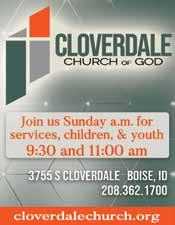
Are you in an unstable housing situation?
Are you ready to pursue holistic wellness? CALL (208) 615-3112

Probably like me you know folks who openly proclaim, “Oh, yes, I’ve given my heart to Jesus!”
Yet, when you share a cup of coffee, they express ideas that clash with biblical teachings. Listening to them you discern that clash all the while they are agreeable, congenial, and even nice. Again, when it comes to how they live their lives and spend their energy, you discern an obvious disconnect. Or still more narrowly, when they talk about American society, or what plagues culture, or what kinds of things might heal our nation they suggest solutions that, again, break with biblical categories. They are comfortable with notions of governmental utopias apart from the existence and judgment of God.
What is going on? Increasingly, I am learning, they have given their hearts to Jesus but not their minds. Earnestly they want to connect with God through their emotions but they variously process reality apart from the character of God, the biblical teachings, and the wisdom of the Church. On Sunday they readily participate in worship. Yet when they live their private lives, when they vote, and when they articulate their understanding of morality, next to nothing of the identity of Jesus Christ or His words informs their mindset.
Jesus revealed what should characterize His disciples when He said, “You shall love the Lord your God with all your heart, and with all your soul, and with all your mind,” Matt. 22:37 (NASB). His identity-framing command there in Matthew was taken directly from Moses’ own great Shema, “Hear (shema), O Israel, the Lord is our God, the Lord is one! You shall love the Lord your God with all your heart and with all your soul and with all your might,” Deut. 6:4-6 (NASB). For centuries on end worshiping Jews had recited the Shema as their pledge of allegiance to God. So Jesus was saying, “with Me that ancient and central Shema-core abides: you shall give your entire self to God, including your mind.”
Frankly? It’s a daunting command. Give our entire self to God?! Give even our intellectual processing to King Jesus? That’s terrifying! Are we all called to earn a Ph.D. in Biblical Studies? Should we all be professional pastors? No, and no. That’s not what Jesus was saying.

What He was saying is that he commands the entirety of our identity. It’s rather terrifying – and that is how people in the Bible regularly respond to encountering God: in terror – that God is a totalizing being! He thinks He is the Lord of everything. We don’t get to say we believe in God and then nonchalantly commit crimes. We don’t get to say we enjoy worshiping God in corporate gatherings, but then live in a day-to-day reality that is cut off from the character of God. We don’t get to feel warm feelings about Jesus, but then indwell a worldview – an intellectual processing lens – that is divorced from biblical teachings. We don’t get to have Christian hearts and secular minds.
How’d we get here? How’s what I related above about intellectually disconnected believers even possible? Well, I cannot here unpack Western secularism’s history, but we should realize that that above-described and now-too-common dynamic of a heartand-mind disconnect is rooted in the secular dogma that there
are two kinds of truth. There is public truth and there is private truth.
Public truth is the kind of truth – we used to call it common sense – that “everyone recognizes and lives with regard to.” Private truth is truth that goes to one’s own opinions, dreams, and goals. Public truth is objective. Private truth is subjective. Public truth involves things like science and engineering. Private truth involves things like morality and religion. Public truth concerns what is. Private truth concerns what ought to be. Public truth is king. Private truth, that waif, is kept in the closet.
However, we should be mindful (pun intended) that science is not really so objective. When, during the recent pandemic we were told, “trust the science,” we were being cajoled to split private truth away from public truth and so to hand over the power of our own agency to “experts.” But the truth is? Science rests upon premises that it cannot itself prove. For instance, as A.I. scientist Marvin Minsky once put it, if “the human mind is just a 3 pound computer made of meat,” how can we possibly trust that human minds can solve the problems that best humanity? Or, if it is impossible to know True-Truth, why on earth do we trust the future of humanity to “experts”?
Still more? Who do you know who lives life based on raw science? Just who do you know who makes decisions that are one-hundred percent objective? No, the secular power-play now is that what used to be the most cherished things – religion, beauty, goodness, and morality – are relegated to the private domain. And so the most important things in life to all of humanity are no longer allowed in the public square. Now that’s a disconnect!
My friend, secularism has been around now for a solid two hundred years. Even emotionally sincere Christians have breathed in and breathed out – like water washing through a fish’s gills every single moment of its wet life – the intellectual liquid of secularism. And so – with the help of the educational system, the pervasive influence of pop-culture, and the power of the purse used strategically by politicians – secularism pervades most everything that goes to intellectual formation here in the West. Is it any wonder then that so many Christians do not do reality with the mind of Christ?
To remedy this heart-vs-mind disconnect I host worldview workshops for churches, youth groups, and Christian organizations. We think together variously about what is a worldview? What is a Christian worldview? How does a biblical worldview compare to a secular worldview? And what does it mean to have the mind of Christ? (1 Cor. 2:16).
Today we are living in an unprecedented era of intellectual darkness. That intellectual darkness spills over directly into moral confusion and darkness. Hence, it is time for believers to dig into their faith like never before. Help us, Holy Spirit, to have minds on fire for the risen Christ! n
The following information is provided by Wednesday’s Child, an organization that helps Idaho foster children find permanent homes.
McKenzie, 15, is an eclectic and talented teen who does a wonderful job of expressing herself and has a flair for all things artistic. She can often be found drawing Manga; writing songs; practicing special effects makeup; reading; or engaging in her favorite pastime, which consists of sitting on a swing and listening to music.
Those who know McKenzie best would describe her as a kind and compassionate soul who has worked hard to overcome her past trauma and who envisions a bright future for herself. McKenzie is learning to face her issues head-on, in positive ways, so that she can set a great example for her younger brothers.
If she could be granted three wishes, McKenzie thoughtfully described that she would “wish for help to be available to everyone who needed it; that children could be raised in good environments so that they could be taught the right things and become lovely individuals that would change the world for the better; and that people didn’t have to lose the ones they love when they need them the most.”
She believes that everyone has a voice that matters and would love to travel to Washington, D.C. and be able to tell the president
that inflation is causing too much homelessness and suffering throughout our country.
McKenzie does very well in school and aspires to one day attend the Julliard School of Music to fulfill her dream of becoming a singer-songwriter.

McKenzie and her team describe a great fit in a family for her as one having parents who are attentive, active and who enjoy traveling. Most important to this deserving teen is simply finding a family that accepts her and wants to spend time with her, even if it’s just doing everyday things like eating dinner together. The best fit for McKenzie is a home where she can be the youngest or only child.
McKenzie has a tremendous amount of strength and courage and is truly an overcomer. The love and support of a committed family is the final thing that she needs in order to be able to reach her full potential in life. If getting to know a bit about this resilient teen has struck a chord with you, inquire today at www.idahowednesdayschild.org. n
For more information on the Idaho Wednesday’s Child Program, visit www.idahowednesdayschild.org, or contact Specialized Recruitment Services Administrator Shawn White at swhite52@ewu.edu or cell (208) 488-8989.

The ten-year anniversary of Christian Living Magazine – what a blessing!


The best organizations in general, and ministries especially, do not have a successful, mostly smooth and completely life-changing, adventurous journey with leaders who suffer from the “Hurry Virus.” Thank you, Jesus, that Sandy Jones and her team of believers sought after Your timing and not theirs in growing the soulsaving ministry of Christian Living Magazine.
I think that it might be a valid statement to say that, “More people, right now, suffer from the ‘hurry virus’ than suffered from the ‘coronavirus’.”

A pastor friend of mine spoke about a book that I believe all of us should have in our Real Man’s Toolbox. This book is “The Ruthless Elimination of Hurry” by John Mark Comer. How many of us are pulled in multiple directions every day? How many of us are frustrated that we never get everything accomplished that we set out to do? How many of us complain that there just aren’t enough hours in a day to be successful in completing our to-do list?
The first Scripture in this book sets the stage in a very frank and to-the-point manner.
Jesus says, “Come to me, all you who are weary and burdened, and I will give you rest. Take my yoke upon you and learn from me, for I am gentle and humble in heart, and you will find rest for your souls. For my yoke is easy and my burden is light.” – Matthew 11:28-30
In his book, Comer unpacks the fact that today’s psychologists and other mental health professionals are now talking about an epidemic of the modern world: “hurry sickness.” He points out that the mental health community says that “hurry sickness” is a behavior pattern characterized by continual rushing and anxiousness. It is also a malaise in which a person feels chronically short of time, and so tends to perform every task faster, and gets flustered when encountering any kind of delay. A cardiologist defines “hurry sickness” as a continuous struggle and unremitting attempts to accomplish or achieve more and more things, or participate in more and more events, in less and less time.
Does anyone’s name in particular come to mind when thinking about these traits? Now the hard question: “Do you see YOU in any of these behaviors?”
To help answer this question accurately and truthfully, Comer lays out ten symptoms of “hurry sickness.” Take an inventory of your life and honestly determine which symp toms reflect you. The symptoms of “hurry sickness” are: irritability, hypersensitivity, restlessness, workaholism (or just nonstop activity), emotional numbness, out-oforder priorities, lack of care for your body, escapist behaviors, slippage of spiritual disciplines, and isolation.
In this book, Comer asks us to reject any guilt or shame we may feel. He says that it is not help ful, rarely from God.

There are four primary practices that are essential to “The Ruthless Elimination of Hurry.” If you will consistently and boldly place silence and solitude into your life, observe the Sabbath (regardless what day you choose), bring simplicity into your daily schedule, and very literally slow down in every aspect of your existence, then maybe you will believe and see that life is good in this world.
With the vast majority of people around us living their lives deeply hurried, it is very difficult for us to attempt to eliminate hurry from our lives. We need to change our focus; we need to change our foundation. We need to slow down and listen for God’s still, small voice. We need to simplify our daily schedules. We don’t have to do everything that is available. It is much better to do a few things with excellence, instead of doing many things in a mediocre manner. We need to observe the Sabbath. The word Sabbath literally means “to stop.” We need to take a day to stop what we are doing, rest, delight in God and His creation, and refresh ourselves, so we can serve Him valiantly for another week. We must have silence and solitude to hear God and marvel in His love and provision for us.
Living a life of hurrying is debilitating, distracting, and destructive. Living a life of hurrying is counter to God’s will for our lives. Living a life of hurrying can keep us from ministering to those people God brings across our path.

Please understand, as I went through this book and as I prepared this column, a lot of the words I saw, and the challenges I felt, were directed right at me. I assure you, I will be changing the way I live my life as a result of examining this book. As a Real Christian Man, I have been challenged to evaluate my own life and determine how I can do a better job of “Ruthlessly Eliminating Hurry” from my life.
I ask each of you to pick up a copy of this book. Take a deep dive into these challenging concepts. Please realize that this is definitely not a sprint; it is without a doubt a marathon – and possibly even an Ironman Triathlon. Are you up to the challenge? Come along for the adventure, see what kind of a man God will mold you into once you successfully “Ruthlessly Eliminate Hurry” in your life. n
Leo Hellyer is a non-staff pastor with a Treasure Valley church and has been married to his wife Norma for 50 years. Leo and Norma served together on the Boise FamilyLife Volunteer Ministry Team for 20 years. Leo has served with Boise Rescue Mission Ministries for 22 years, currently at the River of Life Rescue Mission. He is President and Chief Firearms Instructor with Helping Hands Firearms Training LLC, and is a Civilian Taser Instructor. If you have any questions about Real Man’s Toolbox, or need other assistance, he may be reached at silverplate426@msn.com or (208) 240-5544.
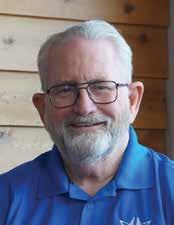










 By Gaye Bunderson
By Gaye Bunderson
Jim Manley, now 77, became a Christian early in life under the most peculiar circumstances. He was a hitchhiking hippie back then.
“After I got out of the Marine Corp, working in avionics, I did the next logical thing and became a hippie,” Manley said, with a touch of humor. In those days he sported a beard and long hair down his back. He didn’t do any hard drugs, he said, but he smoked pot and hash – it was the 1970s, after all.
He was attending Palomar College in San Marcos, Calif., and he and friend who had also been in the military got permission from the landowner to set up a tent under a big sumac tree behind the college. To earn money, Manley created jewelry.
“I made wedding rings mostly,” he said.
Unexpectedly, a fire roared through the area near Manley and his tent mate’s home. The young men were able to get their stuff out of their humble shelter on poles, and they then set up residence in a tent in Carlsbad State Park in Carlsbad, Calif.
One day, Manley was hitchhiking back to the park. “I was picked up by a man who was clearly a redneck. He even had a can of beer in his hand,” he said. “Today it’s liberals versus conservatives or Democrats versus Republicans; but back then, it was hippies versus rednecks.”
After he got over the initial surprise of being picked up by a so-called redneck with a beer can, he hopped in. Then the man started talking to him, and things got even more surprising. Stumbling over his words and speaking tentatively, the beer can holder started broaching the subject of faith.
“It was clear he had not done this a lot, but he started talking about Jesus,” Manley explained.
What was even more peculiar, Manley said, is that almost every day for six months, somebody somewhere had been trying to tell him all about Jesus.
“I thought it was baloney,” Manley stated. But he realized at the same time that something in his heart was searching for answers. He had started experimenting with Eastern religions, such as Buddhism, and though the redneck’s witness for Christianity was far from flawless, something stirred in Manley. His interest in the unexpected conversation piqued, and when he was asked, “Do you want to meet Jesus?” something inside him was moved to open up. “It was like a logjam burst,” Manley said, “and to my surprise, I said, ‘Yes.’”
Even the redneck was surprised. He asked, “Are you messing with me?!”
But Manley wasn’t fooling around. He began to pray along with the driver.
“I surrendered,” he said.
Those were his hippie days, of course, and he recalled he might have said something like “this is far out.” But the words he spoke next were the important ones. “Jesus, I can’t run my life. I hand it over to You.”
The redneck, somewhat amazed at this point, suddenly realized he was holding a can of beer, and in response to Manley’s
salvation prayer, he looked at the can and said, “I don’t need this anymore!”
Both men were blessed. Shortly after, they stopped at the park and Manley got out of the vehicle.
“He pulled over right where I needed to go, and I’ve never seen him since. I don’t even know his name. But I’ll know him in heaven.”
At the time, Manley was having an internal conversation with himself, as he fully realized he had just been dramatically changed. “I said to myself, ‘J.R., your life is never going to be the same’.”
And boy, was he right. “The experience changed me. My desires changed. I suddenly had hope.”
For a while, he returned to his regular life. He was working in Fallbrook, Calif., taking care of avocado groves. He didn’t immediately shave his beard nor cut his hair. What ultimately moved him to make a change in his appearance was practicality: “My only means of transportation was a motorcycle, and my hair would get tangled in the wind. I was also a diver and my mask wouldn’t fit well enough because of the beard.”
Despite the transformation in the young man’s heart and appearance, his spirit of adventure was left untouched. An interest in flying was aroused one day when, riding on his motorcycle, he passed a sign that simply read, “Airport.” He rode up to the airport, walked in, and talked to two people there and asked what they did at that little airfield. A woman replied, “We teach people to fly.” Right there, Manley put down a deposit of $136.36 for his first four lessons.
Six months to a year later, Manley met his wife Regina at a Bible study. By then, he’d logged some critical time in flying lessons and found his wife shared his enthusiasm for flight.
In his own online bio at jrmanley.com, Manley wrote: “With the help of the G.I. Bill, I earned a commercial license, then flew for a mining corporation. Next, I attended A&P school (airframe and power parts of an aircraft), specializing in avionics. Later, my wife’s generous gift from an inheritance allowed me to earn a multi-engine rating – which allows the qualifier to fly as pilot-in-command of any aircraft with more than one engine – and then flight and instrument instructor ratings.”
The couple came to be managers of an FBO, or fixed base operation, in Grass Valley, Calif. when Jim was about 32 years old and the parent of two kids at the time. The couple would eventually have four children.






At Grass Valley, Manley gave flight lessons, conducted commercial charter flights, and worked as a contract Air Attack pilot for the U.S. Forest Service. An Air Attack pilot, Manley explained, flies a spotter plan with a fire boss during fire emergencies. “I flew the fire boss around,” he said. “I was like his receptionist and listened to all the calls coming in.”
At the same time as his ongoing aeronautical achievements career, Manley began to feel a pull toward ministry. “It was a growing feeling,” he said. Trying to explain the tug in his heart, he said: “In business, the primary goal is to make a profit. That wasn’t my prime motivation. What motivated me was service.”
There was a bit of confusion, however, about just what a ministry for a pilot might look like, what shape it would take. “My thoughts at the time were that, if you were called to ministry, you became either an evangelist or a pastor.”
He was clear in his mind, though, that evangelism or a pas-

toral ministry wasn’t well-suited to his skills. For two years, he prayed about what the Lord might have in mind for him, even stating to Him, “I’ll do anything You ask except for being a pastor.” He eventually changed his prayer to something more open to the Lord...sort of. “I’d pray, ‘I’ll do anything You ask, even being a pastor. … But I don’t really want to.’”
The Lord was able to handle his honesty and, besides, He had other plans for Jim.
A business associate said to Manley out of the blue one day, “I never told you, but I’m a rep for Mission Aviation Fellowship.”
“I’d heard of MAF,” Manley said. “I thought it was a good thing, but I had no interest.”
Still, he had an MAF business card on file. “It was burning a hole in my Rolodex,” Manley joked.
“It was the fire season, and I had a lot of prayer time. The short version of the story is, I finally came to the conclusion that I should try to get into MAF.”
That lead him to speak to leaders and staff at MAF and decide he was all in. But then he thought, “How am I going to tell my wife?!”
When the couple moved into the house where they were living at the time, Manley had told Regina to “burn the boxes, we’re never moving again.”
He thought he’d tell his wife gradually; but before he knew it, he’d jumped right in the minute he saw her and said, “I think we should join MAF, go to the jungle, and fly planes for Jesus.”
It was all out in a single sentence.
Continued on page 17
I began coaching couples over 16 years ago. During that time, I have identified several problems that are common to most married couples. Each couple has their own unique version of the problem, but the underlying issues are pretty much the same.
One of the problems I identified was that couples seldom talk about their relationship. Oh, they talk – about the kids, their jobs, their siblings and families of origin, politics, etc., but they don’t talk specifically about their relationship.
Another thing I have learned is that most couples don’t do a good job of managing their emotional energy. We only have so much emotional energy for a day. And when we have a day that is going to be emotionally draining, at the close of that day we will have little or no emotional energy to give to the relationship. If we don’t understand this concept and how it affects each of us individually, we end up with a lot of misunderstandings, hurt feelings, and increased emotional distancing.
I have also realized that one of the most difficult things for us to do is to really understand our spouse’s perspective on different things. We have unique perspectives because we are unique. God’s design for marriage is a man and a woman in covenant relationship for life. A man and a woman – that very fact, in and of itself, gives us very different perspectives. Regardless of what popular thought may be, men and women are very different. We see life differently. We have different perspectives – and they will always be different. Add to that the fact that husbands and wives come from different families of origins with differing perspectives. Then add to this cauldron the fact that prior to marriage you each had different life experiences that contributed to shaping your unique perspectives. You are unique and you have a unique perspective.
You may say, “So what?”. In the real world this means that the two of you can look at the same set of circumstances and come to two totally different conclusions. In the seminars I do I ask a couple to stand back-to-back in the center of the room. Then I ask them, one at a time, to describe what they see. Typically, one of them will be looking at a wall with windows, possibly curtains, etc. and the other will be looking at a wall with an exit door and maybe some pictures hanging on the wall. Then I ask the audience to answer this question, “Which one is right?” Their response is normally, “Both are right.” And that’s true, but their answers were different. But from their unique perspective, each of them was right. Then I ask the audience, “Is your marriage healthy enough that you can accept the fact that you can both be right about something and yet be on opposite sides just because of perspective?”
In marriages that have not come to grips with the concept of perspective, the couples use communication to convince rather than to connect. They know their own perspective is not only factually correct but that it also “feels right”. And since their spouse has an opposite viewpoint, they must be wrong. And thus, they begin to try and convince their spouse of their position instead of trying to understand their spouse’s unique perspective. They try to convince rather than connect.
Any victory that one of them may claim will be a hollow victory. And the net effect will be that they are further apart emotionally.
If, in fact, they put their energy into trying to understand their spouse’s perspective and then meet somewhere in the middle, they will find themselves connecting more deeply.
Another thing I have learned over these 16+ years is that most couples don’t recognize and understand their need to be continually, intentionally, learning about relationships in general and theirs specifically. They only seem interested in learning about them when they find their relationship in trouble. I think a great part of that comes because the way relationships are portrayed is that they will “just work out”. But they don’t.
I’ve searched for various tools to help couples in these areas but never really found one that put everything together in an easy, simple way. And thus, the birth of The MUM 3 Step Connection Plan. Step 1 of the plan is the Sunday Night Meeting. This is where you lay out your upcoming week and discuss the tasks you must do and whether they give you emotional energy or deplete you of emotional energy. I created a downloadable PDF to assist you in this area.
Step 2 of the plan is the Daily Check-in. These short meetings include, at a minimum, answering these questions: (1) What is one positive thing that happened today? And, why do you consider it a positive? (2) What is one negative thing that happened today? And, why do you consider it a negative? (3) What is one thing you appreciate about your spouse today? And why? The “whys” are the most important part of these questions because they will help you better understand your spouse’s perspective.
Step 3 of the plan is the Weekly Relationship Check-in. This is a time to talk about the relationship and get input from each other. It is not a time to solve or deal with specific issues. It’s a time of discovery, to hear and be heard, and to understand and be understood. There are questions provided to help you. And then I recommend you listen to the MUM Moments audio teaching for that week. This 4-6 minute audio, along with furnished starter questions, will help you in learning more about relationships and how to apply this knowledge to your particular relationship.
To further check out The MUM 3 Step Connection Plan, go to my website, www.mutualunderstanding.net, and on the Home Page, click on the “Click To See How” button. Watch the explanation video and listen to the sample MUM Moments audio.
These three simple steps will change your marriage. n
Gary Moore served as associate pastor at Cloverdale Church of God for 15 years. He does couples’ coaching and leads couples’ workshops and retreats called MUM’s the Word. He has a weekly radio program – Life Point Plus – on KBXL 94.1FM at 8:45 a.m. on Fridays. His website at www.mutualunderstanding.net has video teachings and other resources for couples. He may be contacted at glmoore113@gmail.com.
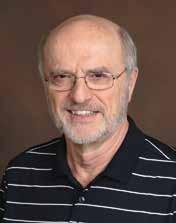
Continued from page 15
Regina burst into tears, and it took her husband a minute to realize she was crying tears of happiness. An entire seven years prior to her husband’s revelation that they should join MAF, and a few years after a packet of MAF information showed up in their mailbox, Regina conceived her own dream of joining the fellowship.
The maf.org website describes its work: “People living in isolation are cut off from the outside world, with little to no access to health care, education, supplies, and the hope of the gospel. Our airplanes are the only way many people living in remote jungles, deserts, and mountains have access to life-giving necessities and the love of Christ. You can help us – and the hundreds of churches, missionaries, and organizations we serve – bring help, hope, and healing to the ends of the earth.”
The Manleys were ready to sign up. It took some time before their mission became a reality; but two years later, they were in Costa Rica providing aviation services.
The Manleys started their work in 1985. Their job was to fly the evangelists, pastors, and others into rarely traveled areas to serve indigenous peoples. They worked with people who spoke Spanish and with six different indigenous groups, each with their own language. They encountered primitive, Stone Age-like groups in need of health care, education, and an opportunity to learn about the Lord.
It was a difficult task, because they flew all over, going from once place to another in and out of rugged terrain. Said Manley, “In the jungle, you have two options for transportation: walking or flying.”
In some places, the people had created airstrips using machetes and shovels over the course of at least two years. “Heavy equipment for them would be a wheelbarrow,” Manley stated.
In many of the regions the Manleys traversed, it was stiflingly hot; and when it wasn’t too hot, the average annual rainfall could top 21 feet.
“It was a different culture, but I loved working with the native peoples,” said Manley.
The couple have had their feet firmly planted in modern America for quite some time now. After 17 years in the field, they were transferred to the organization’s current home base in Nampa. In 2015, Manley left MAF after years of valued service as a pilot and, surprisingly, as a journalist for MAF, writing web and paper copy, technical manuals, articles, and blog posts.
The one-time hippie-slash-astronomy major still enjoys writing, while his wife works for Paraclete Mission Group, taking the two Idahoans on occasion to such places as Sierra Leone, Kenya, and India.
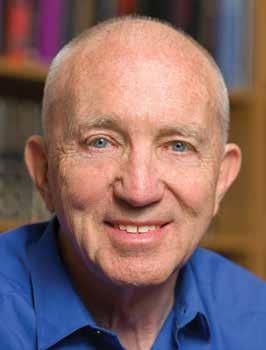
The Manleys don’t see themselves as retired and have no plans to enter that leisurely lifestyle common to many older folks. Instead, they say “we’re not retired, we’re refired for service – we are blessed to be a blessing because God’s given us health and skills we can use.”
Jim Manley goes so far as to state that writing is his second dream job after flying. He’s written several books, including Call for News: Reflections of a Missionary Pilot and Mile-High Missionary: A Jungle Pilot’s Memoir. His latest book is titled The Perelandia Paradox, and it is a Christian science fiction story. He had this to say about his No. 2 dream career: “My main passion is writing about how God uses ordinary people to meet extraordinary circumstances.”
And that sounds a lot like his own life, all 77 years of it. n
We’ve never been taught how to “do relationship”

Gary Moore’s Mutual Under stand Method® is a straightfor ward, common sense approach that weaves scr ipture & psychological research toget her.

September 15th & 16th
Cloverdale Church of God
3755 S Cloverdale Rd, Boise
(Friday from 7pm to 9pm Saturday 8:30am to 12:30pm)
Sessions Sneak Peak :
• Relationships & Emotional Energy
• Hopes, Dreams & Desires vs. Expectations
• Six Divorce Predicto rs and their Antidotes
Just to name a few of the topics covered in this dynamic conference
Early Bird Pricin g: $40/couple
Af ter 8/31: $50/couple
This retreat was one of the most inspiring weekends my husband & I have ever experienced.
- Chris & Marie
Register online at MutualUnder standing.net
Sponsored by
 By Joan Endicott
By Joan Endicott

I’m so proud to be an American. I love this country. I love our freedom. I love and appreciate all who sacrifice(d) to make it—and keep it—a free country. It truly is the home of the free because of the brave. Though our freedom means we each get to choose how we use that, I pray all who experience its blessing will be unwavering in honoring those who have honored this country through their personal sacrifice. While those who gave their lives made the ultimate sacrifice, one can only imagine how those who were imprisoned and tortured wished at times to be among their fellow soldiers no longer suffering. “Greater love has no one than this, that someone lay down his life for his friends.” – John 15:13
My uncle, Captain James Myrick, was my personal connection to the Vietnam War. As a chopper pilot, he was shot down three times! Thank God, never captured. As a grade schooler, I was deeply moved by the experiences he shared and felt honored when he gave me a set of his Wings. Additionally, I began wearing Prisoner of War (POW) and Missing in Action (MIA) bracelets, which helped remind me to pray for those incredibly sacrificial souls: for their quick, safe return while also heightening others’ awareness to do the same. No other time did I see my grandma Lucille so overcome with emotion as when my mom picked Jim up at the airport to surprise her. As he stood at the kitchen door, tall and proud in his uniform decorated with multiple medals, my grandma looked over, gasped, and collapsed with sheer gratitude unable to speak, only weep, as she clung to her son.
“On August 4, 1964, a 26-year-old Navy fighter pilot was shot down over North Vietnam. The first American airman to be captured by the Vietnamese, Everett Alvarez was a prisoner of war for eight and a half years—the longest period of captivity of any American war prisoner in North Vietnam. Alvarez, along with 461 other captured American airmen, would not be released until the Paris Peace Accords were signed in 1973.
“American Experience presents ‘Return with Honor,’ the story of these captured airmen, featuring rare film footage from Vietnam’s archives. This two-hour special from Academy Award-winning filmmakers Freida Lee Mock and Terry Sanders represents ‘a major shift in the screen image of the Vietnam veteran,’ according to The New York Times. More than 20 veterans describe their captivity and their struggle to survive—mentally, physically, and spiritually—and to return with honor. The film is introduced by Tom Hanks, who says, ‘I am fascinated and moved by these stories of extraordinary courage, sacrifice, and heroism.’
“‘Return with Honor’ is a testament to the ingenuity and endurance of these extraordinary men. Through riveting first-person accounts, the film describes their sudden transformation from self-confident ‘top-gun’ aviators into prisoners of
war. The men recall the harrowing moments of their shoot down and capture, the many years they were kept in solitary confinement, and the repeated bouts of excruciating torture. And it is also the story of the women left behind who for years did not know whether they were wives or widows.” (Available on YouTube and at www. pbs.org. Information here taken from American Experience.)
Watching these hero aviators share their personal stories, you experience a plethora of emotions, from anger (at the horrific treatment) to sorrow, compassion, and pride. As the pilots were being tortured, the Viet Cong would show them newspapers and play propaganda newsreels of people parading in protest in the United States, burning flags as they burned with anger at our own troops.
The following quotes are a combination of the war heroes interviewed in “Return with Honor”: Lt. JG Everett Alvarez, USN; Comdr. James Stockdale, USN; Lt. Ed Mechenbier, USAF; Lt. John (“Mike”) McGrath, USN; Lt. Ron Bliss, USAF; Lt. Cmdr. John McCain, USN.
• “They would tell us, ‘Okay, there are all kinds of parades in Washington DC—antiwar protests—and I just needed to tune all that stuff out because certainly, as military people, if we didn’t question the value of the war as we went into it, you know, sitting in prison wasn’t the time to start reexamining whether we ought to be in there or not.”
• “They would bring films that [were] made in the states. The burning of the cities and all of that—we got to see that. And just about every one of us was very upset. We couldn’t understand what was happening to the American people.”
• “We felt, well okay this is the American way, you can demonstrate. But a lot of us were a little dismayed as to why they were doing this…All we had left in our immediate world was each other. All we had were our reputations. It was a matter of dignity. All we had left of what we were was our name and our honor. That’s all you have left and you’re not gonna give it up.”
• “We were determined to return to the United States with honor, no matter how long we stayed there. We were not going to collaborate with the enemy, and we were going to look out for each other.”
They began bolstering one another’s courage and commitment to stay the course with a powerful three-word-phrase: “Return with Honor,” which for them meant, “Don’t do anything that you wouldn’t go back and tell somebody else in your cell, ‘Hey, I did ______,’ and be ashamed.”
These pilot heroes also shared how their faith and thoughts of their family played an enormous role in keeping them strong and steadfast during this horrific and inhumane treatment.
They developed their own tapping code so they could communicate with one another. Once that was set up, every single
Sunday morning they were in North Vietnam, they would have a church service. They started with the leader making a particular sound to know it was time to recite The Lord’s Prayer together. Then they turned to face east (direction of the United States of America) and each held his hand over his heart, proudly reciting the Pledge of Allegiance. Just picture that! It inspires awe in my soul and brings tears to my eyes as I reflect on the depth of their love and commitment.
As I began to ponder the phrase “Return with Honor,” I thought about how every relationship we have should be treated with this deepest level of commitment. If I pledge in my heart and soul to return with honor, its power is palpable!
Return: to go (or come) back in thought, practice or condition
Honor: to regard or treat (someone) with admiration and respect






Honor and honest have the same Latin origin.
Honest: virtuous, honorable, dealing fairly, truthful, free from deceit

When I make a commitment, it means I honor my word and stay true to fulfill any promise made. This can be an agreement, a contract, covenant, oath, vow, or pledge—verbal or written.
When choosing to embrace this return with honor philosophy, it elevates every area—every relationship—in my life. It affects my thoughts, words and actions because at its core I am choosing to be an honorable/honest person.
For example, in marriage, we make a promise or vow to our mates that includes something like: “I, _____, take you, _____, for my lawful wedded husband/wife, to have and to hold from this day forward, for better, for worse, for richer, for poorer, in sickness and in health, until death do us part. I will love and honor you all the days of my life.”
Literally and symbolically, each time we leave our home and come back, we’re making choices in what we think, say and do to honor our promises: in marriage and family relationships, at work, at church, in community, in our finances. In every area of life we get to continually choose to honor the relationships and commitments God has blessed us with.
At its core, it’s about embracing honor as a beloved character trait. These faithful and faith-filled men made a commitment that whatever they did, even in the most horrific of circumstances, no matter what it took, they would live a life of honor and have no regrets when they returned home. They chose to honor their country, their own name, their fellow soldiers, their mission, their family awaiting their safe return. May we be inspired by their unparalleled example and be among those who choose to do whatever it takes to Return with Honor n
Grab your FREE copy of Joan Endicott’s “I Get To!”® book at www.JoanEndicott.com. Joan is an Award-Winning Keynote Speaker, Author, and Coach whose coaching has reached over 30 countries. Meet her and enjoy her encouraging messages on Facebook and Instagram!
“Be devoted to one another in love. Honor one another above yourselves.”
— Romans 12:10
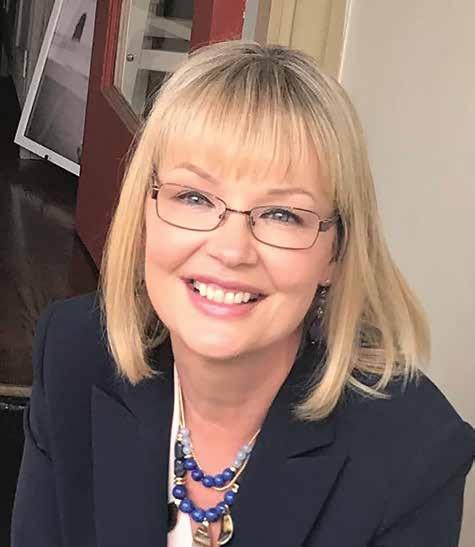
Of all the gifts given to Christians, Teresa Nickell was given the gift of desperation, and it benefited her twice in her life.
Considering a past that included a harshly critical mother, selling marijuana at school in the eighth grade, abuse from a stepfather and subsequent rage from her disbelieving mom – who kicked her out of the house at 14 –it’s no wonder that Nickell reached her rope’s end. But before that end, she’d endured a life of homelessness, incarceration, abusive husbands, and addictions that covered a spectrum of dangerous drugs and alcohol.
At 57, Nickell’s story entails decades but also includes salvation, career success, a good marriage, and experience as an author and public speaker.
Nickell chronicled her life in a book titled, “The Girl In Your Wallet.” Some of the information in this article was taken from the book (as noted), some of it comes from a brief interview with Nickell in person, and some of it comes from a speech Nickell made to a group at Eagle Christian Church. The book is a comprehensive account of Nickell’s life; this is an abridged version.
When asked how she survived her childhood and her twenties, and why she finally sought help, she said, “I got tired of going to jail. I was given the gift of desperation. I had nothing left.”
That marked the first time desperation turned her life around, and it gave her the willingness to aim for something higher. The transition started, oddly enough, when she was arrested and charged with possession of a controlled substance with intent to deliver. In the book, she tells how, at age 26, her misdemeanors became felonies and she was put in the Pierce County Jail in Tacoma, Wash.

Out on bail, she was advised by someone she’d met while behind bars to go the state welfare office, admit she was a drug addict, and hopefully qualify for the state’s free drug treatment program. She did that and was immediately sent to rehab. There, she was able to talk to a counselor, and it gave her hope. After sharing many details about her difficult and sordid life, the counselor commented, “Wow, aren’t you tired? Living a life like that must take a lot of work.”
Nickell: Yes, she was tired.
Then the counselor asked her if she’d ever considered suicide.
Nickell: She had not.
The counselor asked, “Really? Why not?”
Nickell: The silence that ensued offered her a moment of clarity.
She writes in the book: “I had exhausted everything and everyone. I had nothing left. If I were to survive, I would need to change.”
She was ready to do the hard work.
Continued on page 22
Jeremiah 29:11 reads: “‘For I know the plans I have for you,’ declares the Lord, ‘plans to prosper you and not to harm you, plans to give you hope and a future.’”
For Kelsey Korvela, that Bible verse epitomizes her life, in that not only did the Lord rescue her from her deep, dark pit of despair – twice – He also gave her a future far brighter than she ever imagined.
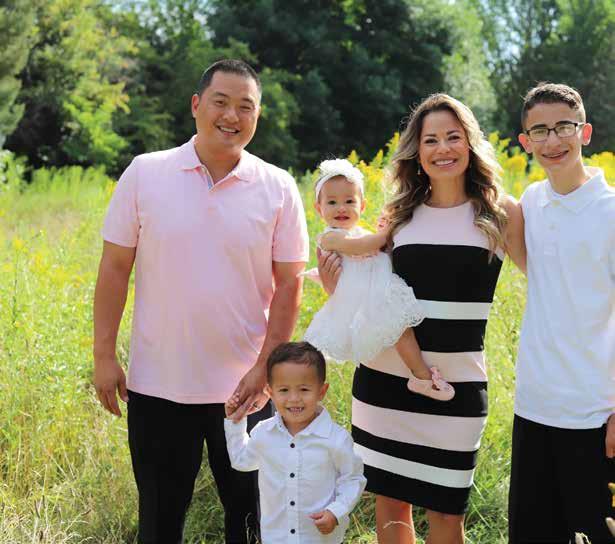
“I was definitely not raised a Christian,” she says. “My parents were not believers, and there was a lot of neglect in my family.” Growing up, she remembers ordering Bibles from various television commercials she saw. “I always had a hunger for ‘something else.’ But no one ever told me about Jesus Christ; no one ever had that conversation with me. I don’t know why. Maybe I wasn’t approachable. I felt I knew God. I remember praying to Him, but I never had that complete understanding of His saving grace.”
At age 15, she began drinking and using drugs – marijuana, mushrooms, LSD, even meth. Anything she could buy from her friends and connections; anything that everyone else was using at the rave parties where she hung out. “All my friends were doing drugs, so it just became a part of my life,” she remembers. And she immediately became addicted. “I thought, Wow. This is it! This is what I’ve been missing! Right away, I felt joy from it. At that time, I hated who I was. I was ashamed of who I was. I never felt good enough. And there was a hole in my heart, a hole where God and Jesus should have been. For me, drugs helped me fill that void. There’s a lot of addiction in my family, so I was probably predisposed to become an addict as well. The minute I started using drugs, I knew I pretty much had given my life away.”
For years, her life continued in a downward spiral. While attending college, she was caught shoplifting school supplies. Normally, stealing highlighters and notebooks and such would be a minor misdemeanor, but Kelsey was charged with a felony burglary. “It was considered a felony because I didn’t have any money on my person at the time. So, according to the law, I had intent; I had gone into the store with the thought of stealing,” she explains.
After serving two years total in both the Ada County Jail and the Pocatello Women’s Correctional Center, Kelsey continued to struggle. She wanted to break her addictions – to stop drinking, stop using drugs. “But I couldn’t. I didn’t know how,” she admits. To the point where, after several probation violations and consistently ending up back behind bars, “I didn’t know what I was going to do with myself.”
However, little did she realize at the time that her crimes, her addictions, her struggles would end up saving her life. And bringing her to the Lord.
One Sunday, while still on probation, she “wandered” – as she put it – into a church in downtown Boise. It was a fairly large congregation. And even though she felt she “knew God,” she felt somewhat out of place in the church. Unworthy. And uncomfortable among all the congregants.
So she found her way up to the secluded top balcony area, sat, and began listening to the sermon. “As the pastor was giving his message, he suddenly stopped and said, ‘I don’t know who you are or where you’re at inside this building, but I feel I can’t continue with my message until you come down here and get saved – and accept Jesus Christ into your heart.’ Of course, I knew he was talking to me. Then he said, ‘I’m not going to continue, so I think you need to come down.’ Ten or fifteen minutes passed but, to me, it felt like an eternity. All the while, he just sat there, silently praying. Then finally, I stood, came down from my seat up in the balcony, walked down to the front of the church, and gave my heart to the Lord.
Continued on page 24
Continued
The counselor suggested she attend Alcoholics Anonymous meetings, and though some may remark that AA isn’t a Christian program, she nonetheless found the Lord through it. The 12-step program opened her eyes when she got to Step 5 and “admitted to God, to oneself, and to another human being the exact nature of [her] wrongs (www.aa.org).”
She was 29 when she accepted Christ, and in His grace, He gave her time to work through her past. “I was foul-mouthed, abrasive, and street-hardened. I was not easy to be around,” Nickell admitted. But a cherished Scripture was, “Do not despise these small beginnings, for the Lord rejoices to see the work begin” (Zechariah 4:10).
She was beaten down from years of struggling to survive, living in an abandoned building with other hardcore addicts, scraping by not just on her wits alone but by lying, manipulating, maneuvering, and working the system any way she could. She was married at 17 and had a child at 18. She lost custody of her son at age 22.
She got strong mentors through AA, who steered her patiently through the process as she climbed the high, craggy mountain of recovery. It all took time. Her favorite mentor was an older woman named Joyce K., who guided Nickell, listened to her, persevered with her, and eventually led her to accept Jesus as her Savior. In fact, according to Nickell, “God would use this woman to save my life.”
As time progressed and she continued the recovery process, she pursued a vocation, earning an associate’s degree in commercial baking. It was to be the beginning of a road that led to her owning her own business – a long road but one which would be profitable for her.
Her career launched when she went to work for a man named Bob, who owned a commercial bakery in Spokane, Wash., Nickell’s hometown.

She had a knack for the work and found herself gifted in business skills, such as process improvement. She’d sit in on sales meetings, eventually became a salesperson, and found her street smarts served her well in that capacity. “I just had to take the dishonesty out of it,” she said.
Past survival skills turned into business problem-solving skills.

No one she worked with knew of her past, and they all trusted her. So, she said, “I decided to become trustworthy” – a huge lifestyle change for a woman who, at age 13, had been given pot, hallucinogenic mushrooms, and LSD by her father’s biker friends.

Despite the success, Nickell continued to mentally and emotionally relive all the bad things she’d done. The memories wouldn’t disappear. They cycled through her incessantly, and as her income grew, she sought the help of mental health professionals.
Still, she soldiered through those moments, determined to leave her past behind. “I began to understand I needed to go all-in. It was time to go after my relationship with Christ with the same dedication I had given my addiction.” The Lord continued His work in her, as she continued to improve in her career.
After working with Bob and learning what she could, Nickell was chosen to set up and run a new 12,000-square-foot bakery in Kent, Wash. It was challenging, but her career continued its upward climb.

The learning curve was wide. Some of the problems she encountered included: troubling employee practices; non-profitable customers; and the costs of small production runs. One of the highest hurdles was handling the company’s finances.
“I was skilled in many areas,” Nickell said in her book, “but Bob did not teach me how to run the finances.” The company suffered as a result. Nickell gave herself a pay cut, made a short sale on her home, and returned her Acura to the car dealer. At the culmination of her struggles, in 2012, she sat alone in private and did the unthinkable: she shouted at God. “What do you want from me?” she asked. “You said You would never leave me, but I’m not feeling You in any of this!”
Then, God did the unanticipated: He spoke back and in her spirit said, “Finally.”
She was finally ready to give everything to Him, not just her spiritual growth but her entire life, including the business. She felt she was being prompted to hire a bakery consultant, and that’s what she did. In the years from 2005 to 2017, this is just a little of what was accomplished at the bakery (a brief synopsis from the book, followed by two quotes, also from the book):
• Annual revenue increased from $1.9 million to $3.6 million, with distribution in Washington, Oregon, and Alaska
• Growth
• Diversification
• Exceptional customer service

• The hiring of a veteran of the baking industry as operations manager
Nickell explained about the hiring, “My two-year commercial baking degree would not keep us competitive in the marketplace, and I knew it. I had taken the bakery as far as I could with my limited schooling. We needed automation and experience.
“I began to realize I had been capable the entire time. I had looked at myself and seen only the high school dropout, the convicted felon, and the drug addict, not understanding that I was no longer any of those things. It wasn’t until I reached the end of myself and submitted it all to God that I had the privilege of watching what He would do through me. It was another example of the gift of desperation.”
She later retired after an impressive run in the commercial bakery business.
“God let me know my time there was complete. On December 31, 2016, I signed the final sales document and walked out the door for the very last time. I was brought to tears when I had the privilege of walking into my church’s finance office and giving them my donation from the sale. The entire journey with
the company being completed with an act of obedience just levels me. I am not worthy, yet He loves me.”
Nickell now lives in Star, Idaho, and spends her time working with women who are imprisoned and/or addicted. “Women in need of hope” is what she calls them. She’s a national speaker for Prison Fellowship, and said of herself, “I’m sassy and straightforward. People call me when they want someone who’s passionate but direct. I have a great deal of compassion and empathy; I’m an encourager but am also intolerant of those who resist personal responsibility. In my own story, I know I had choices every step of the way. Sometimes – just sometimes – I wasn’t a victim. I was a volunteer.”
Today, Nickell and her current husband, Scott, support the Boise Girls Academy (BGA) in Nampa, a program she wishes had been available to her as a young woman. The couple helps through: 1) giving monthly to BGA’s scholarship fund, 2) service projects at their facility with Rockharbor Church, and, 3) bringing awareness to this Teen Challenge program. Nickell has also committed to donating 50% of all speaking fees to BGA throughout 2023. (Learn more at https://boisegirlsacademy.org/)
Nickell connects with her son now, who even told her that her decision to give him up to paternal in-laws was the right decision at the time and she needed to stop hammering herself with guilt over it. She also healed her relationship with her mother before she passed away in 2021.
She married three times but said God definitely brought Scott into her life. The two of them share jokes and even get a little silly sometimes. “I do silly stuff all the time,” Nickell said. It’s a way for her to experience the childhood she never had.
“I am no longer suffering. I am living in victory.” n
For more information, go to teresanickell.com.
Continued from page 21
I remember it seemed like everybody in the congregation was laying hands on me. Right then, I felt captivated by the Holy Spirit. I had no idea what I was accepting or what God was calling me to, but I knew it was real. That was my first true encounter with Jesus Christ.”
Along the way, she had heard about City Light*, the Boise Rescue Mission’s Women’s and Children’s Shelter offering a safe haven and emergency services for homeless women and children. Kelsey wasn’t married. She didn’t have children at the time. But she was homeless. And knew she needed help. So she filled out an application.
“I had no self-worth,” she admits. But, despite being accepted into the New Life Program, getting guidance, and making new friends, she still could not shake the feeling that she was “unlovable,” perhaps from being neglected as a child for so many years. “I remember sitting on the back steps of City Light. I was in my early twenties by then. Here I was, living at a homeless shelter. I had no idea how to stay sober. I had made nothing of my life. And what’s more, I felt I was not worthy of anyone’s love,” she says. Then, one of the Center’s female intake coordinators happened by and sat down beside her. “I was weeping … so she put her arms around me. And cried with me. And we sat there, weeping together. As we did, I felt, This place is different. They love me, even though I feel unlovable. And at that moment, God gave me a vision of being ground into the dirt; so broken, that I was just being turned to dust. I had to let myself be broken, I had to thoroughly submit to the program – and to God.” As a result, “They gave me a whole new life! They stepped into my life at a time when I wanted to follow His Word, but I didn’t know how.”
Even though she had read those “TV commercial” Bibles growing up, studying the Word – really studying it – and following the requirements of the New Life Program at first seemed foreign to her. And were certainly challenging. “It took my case manager coming alongside me, praying with me, guiding me, that helped me to not only better understand the Bible, but helped me through the program … both of which eventually gave me clarity of mind,” she recalls.
Going through the program also gave her a better understanding of the services the Boise Rescue Mission provides and how it helps those in despair. Like others in the program, not only did she eventually develop a closer and a much more personal relationship with God, she also helped mop floors, serve meals, work the front desk, and even helped outside with grounds work and landscaping. “Serving people, serving the Mission, really changed my heart and touched my life,” she says.
Soon after, God touched her life in an even more significant way. “My whole bloodline ended up being saved! My father, my mother, my sister … all my family came to accept God into their hearts at pretty much the same time. That’s what He does through the Rescue Mission: He wants to restore faith, hope, and family. And He did! They all have been sober for some 20 years now. It has really been a miracle!” she exclaims.

Kelsey went back to college, earned her degree, got married, and had a son.

But then, in 2013, darkness crept into her life yet again.






“My husband at the time became extremely physically, emotionally, and mentally abusive,” she recalls. In fact, her domestic situation became so dismal, Kelsey attempted to take her own life. “I ended up in the hospital after trying to hang myself. I had struggled a lot over the years with suicidal thoughts; there was always that feeling I was unlovable, that there was something wrong with me. And I just wanted to end it.” So, after her hospital stay, she took her son, who was four years old at the time, left her home, and returned to City Light. “They didn’t know the extent of how far the abuse had gone and what I was going through at the time,” she says. “But I knew I needed more recovery. City Light was the only home I had truly known … and I knew I needed to come home.”
So the folks at City Light graciously welcomed her back; this time, with her son in tow, and helped her complete a program tailored to domestic violence recovery. As a result, for Kelsey, and for countless others it has helped over the years, “The Rescue Mission really became my spiritual family, my rescue family. They’re always with you, always alongside you, helping you through whatever you’re dealing with. They never give up
on you. It’s always your home.” Being familiar with the Rescue Mission’s daily operations, and always having a deep desire in her heart to help others, Kelsey soon joined the staff as an employee. Over time, she worked in various capacities: in the emergency shelter, in events coordination, and in the teen ministry – where she continues to share her life story with young people going through the same struggles, the same temptations she experienced early in her life. “For example, I impart on them how dangerous drugs are. I tell them: even if your parents are addicted, you don’t have to make that same choice. You can learn from other’s mistakes.”
Today, as the New Life Program’s intake coordinator, she screens applications from women who have hit rock bottom and are looking to change their lives. “I find out where they’re at, what they’re looking for,” she explains. “I look to see if they’re willing to lay everything down, to be completely broken, and to be ready for change. If they are, I interview them and explain to them that, to go through the program, they must put all romantic relationships on hold for a minimum of one year, they need to be willing to listen to Christian music – no secular music, watch only G- or PG-rated movies or shows, and essentially be willing to commit to a Bible-based program.”
And for those with low self-worth or in tumultuous relationships such as what Kelsey experienced, “We show them how to put boundaries on their lives, how to be a good parent, how to handle a household budget, we help them earn their GED if they don’t have one, we teach them computer skills, we teach them what sex and marriage look like in God’s eyes, how to treat your body as a temple … essentially, how to be a follower of God, not just a fan.”
What’s more, she says, “I get to be the person who loves people where they’re at; I get to reach out to them and tell them there is hope through our Heavenly Father. I get to pray with them, and help them get into our program. I get to write pen-pal letters and send Bibles to women in jail or prison. So I get to be the hands and feet of both our generous donors and of the Rescue Mission itself. It’s awesome! And we continue to partner with them – for instance, to find jobs or housing –even after they’ve graduated and finished the program.”

Also today, Kelsey has what she describes as “a beautiful family and a beautiful life.” She’s remarried – “to a fantastic husband” – and they have two children together, ages one and three. Plus her son from her previous marriage, who is now fifteen. And, just recently, her criminal record was officially expunged by the State of Idaho. “So now, I’m no longer considered a felon. All my crimes have been completely washed away!”
But more importantly, she says, “Every day, I get to help people who need help. My life is living proof Jesus is real. I show them what Jesus can do in their lives … because of what He has done in mine.” n
Steve Bertel is a multi-award-winning professional radio, television, print media, and social media journalist, who retired after a 30-year broadcasting career. Now a busy freelance writer, he recently released his debut suspense novel “Dolphins of an Unjust Sea”, available on both Amazon and Kindle. Steve and his wife of 40 years live in Meridian, Idaho. He can be reached at stevebertel65@gmail.com.

 By Roxanne Drury
By Roxanne Drury
Have you ever given a particularly slothful child this warning? “You only have one life, don’t waste it.” By these words, of course, you wanted your child to go out and experience life with others rather than sit in front of a TV screen, alone. You wanted him or her to go out and enjoy nature rather than sleep the day away. You wanted him or her to get a job rather than sit and scroll through social media for hours on end or to just do something, anything to make the most of a day!
You probably know this, but God has something to say about this. He has something to say about everything actually. (Uh oh, beware of a rabbit hole… Back to topic… God having something to say about not wasting the days He has given us.) In His Word He calls it “numbering our days.” It’s about way more than just getting a job or taking a hike though.

Psalm 90:12 says, “So teach us to number our days that we may get a heart of wisdom.” In other words, make the most of your days since they are few. Get your priorities straight. Get your heart set on God’s purposes for each of your days. James 4:14 says, “Yet you do not know what tomorrow will bring. What is your life? For you are a mist that appears for a little time and then vanishes.” Life is short. Don’t waste even one day. Oh, but how? How do I prevent wasting my days? One word – prayer.
Instead of waiting to see what each day will bring, we are to prepare for each day through prayer. Appoint each day through prayer. That means taking action to commit each day to the Lord and committing to follow where He leads, do what He wants you to do, and see what and whom He wants you to see. It’s like making an appointment with God to guide your day. Jonathan Cahn in his book “The Book of Mysteries” says it like this, “ You appoint your days in God to bring what is good. You consecrate them for the purposes of God. And then you use your days to accomplish those purposes.”
In the book of Acts we see how Paul numbered and prepared his days. Acts 19:21 tells us that “Paul resolved in the Spirit” to go here or there. Paul was following God’s guidance on his journeys
and went where God led and spoke to whom God wanted him to speak. He appointed his days according to God’s purposes, not his own. Paul was a world changer because he appointed his days according to God’s purposes.
So often we find ourselves at the end of the day asking ourselves, “What did I even do today?” If we have to ask ourselves that question, we have not appointed our day with God.
Even God appointed His days. He appointed holy days, certain feasts, and festivals at certain times of the year. The Israelites were to observe these appointed days. These days were set apart as holy and consecrated to the Lord. The Israelites had divine appointments to focus on the Lord and gather together in worship and prayer (Leviticus 23:1-2).
What I see here is that we are to make the most of our days – not for our own purposes, but for God’s divine purposes. We are to prepare and appoint each day and not allow them to slip through our fingers so that nothing has been accomplished for the Lord. We can’t ignore the opportunities God puts in our path each day to speak a kind word, help someone, pray with a friend, lend a listening ear, and give a word of encouragement. The list goes on and on.
Cahn bids us to “Commit our days into God’s hands and appoint them for the fulfilling of His purposes.” I encourage you to ask God each morning, “Lord, what do You have for me to do today?” Listen. Pay attention. He will give you eyes to see where your appointments are. He will give you a heart to know what needs to be done.
Don’t let a day go by that you have not served the Lord in some way, shape, or form to accomplish His appointed purposes. n

Roxanne Drury is a wife, mother, grandmother, and retired Christian preschool teacher who loves the Lord and His Word. She has served the Lord in children’s ministry for over 45 years and is currently on staff at Rockharbor Church. She has written a book that she calls “a God-inspired book for little girls” and, recently, a devotional book and group study guide on Psalm 23. She may be reached at glorylandbooks@gmail.com.


“What cannot be overcome in prayer? Answer me! What cannot be done by the hand of the Almighty? Answer me! What can be done by your feeble arms? Answer me! He can take down the Iron Curtain in a day; He can convert a nation in an hour. Call upon Him! Believe Him!”
–Paul Washer, American evangelistOne of my earliest articles for Christian Living – perhaps even the first – was about a class I was teaching on the book “The Hiding Place” by Corrie Ten Boom. Years later, I’m once again teaching through that book, and once again, the lessons are coming in waves.
If you’re not familiar with the book, it is the account of a family in Holland that used their home for work in the Dutch underground resistance in WWII, and to hide Jews in a secret room they had constructed in the house. An elderly man and his two middleaged, “spinster daughters” lived in the home, and his other married children, their spouses and older children were also part of the work. It is estimated that the Ten Boom family saved over 800 lives during that time. They credited all of their success to the Lord.
Corrie says that they prayed through everything, and were mysteriously led by the Holy Spirit on who to trust, how to do the work, and that, miraculously, they were able to do much right there in the heart of Holland in their tiny watch shop without being discovered.
Until one day, it seemed, everything went wrong.
It would appear that their lives and work had been a game of Jenga, barely staying together until one wrong move made the whole tower come tumbling down. You’ll have to read the book to know the rest – it’s an incredible testimony to the goodness of God.
But not in the way you might expect.
In the same way, this verse, “You do not have, because you do not ask” (James 4:2c), does not necessarily mean what we think it does at first blush. It would be easy to assume that everything went wrong for the Ten Booms in the moment it did because they prayed wrong or because the enemy was stronger or because God didn’t care about them.
It’s easy to look at this verse and believe that God will give us everything we want as long as we ask.
Dear Christian, it is so much more – and so much better –than that.
We are here for a purpose. Every human that has ever lived or ever will live is made in the image of God and our express purpose is to glorify Him (Isaiah 43:7, 1 Corinthians 10:31, Psalm 73:25-26).
Why did God make vast oceans that we have been unable to fully explore? Because He is glorious.
Why do we continue to discover that the universe is bigger and more complex with unfathomable numbers of galaxies than we originally thought? Because God is glorious.
Why do things go well for us? Because God is glorious.
Why do things fall apart? Because God is glorious.
God can make the lame walk and the blind see; He can also touch the socket of a man and make him lame the rest of his life to act as a reminder of when God changed his name (Genesis 32).
He can take a seeing man and place scales over his eyes, blinding him to the physical world while opening the eyes to his soul (Acts 9). For His glory.
We are saved to glorify the Lord. Every breath we’re given should be as unto the Lord. And this we can’t do on our own, but if we ask, He will train us in righteousness (2 Timothy 3:16). Training takes work, but too often we believe that our walk with the Lord should be without difficulty – which is not at all what He promised. We are willing to endure hardship for reward in nearly other avenue of life – we work hard for a paycheck, we train hard for marathons, we study hard to pass tests. Yes, our salvation is a gift, given to us freely. But we are bought and paid for people, and we have a Master to serve. A Master that designed us to work for things. Not our salvation, no. But rather a worshipful response to His saving grace. While in this flesh, there is much we don’t understand; our good and gracious Lord will teach us. Jesus didn’t just come to save us; He came to live a perfect life in exchange for ours and to show us how to live.
“By this we may know that we are in Him: whoever says he abides in Him ought to walk in the same way in which He walked” (1 John 2:5b-6).
Recently I became aware of how utterly weak I was in the discipline of prayer. I had become lazy and full of excuses. “Well, I just don’t understand exactly how it works. I don’t know what to say. God is sovereign; He does what He pleases, does it matter if I pray?”
It’s not that I didn’t pray or believe that prayer was important (Jesus made time to pray, we should, too!), it’s that I knew I wasn’t praying as I should. I finally stopped making excuses and asked the Lord to train me. Then, I had to show up for the lesson.
I read about prayer, asked a friend to pray that I would obey, and – wouldn’t you know it? – our church just so happened to be starting a Sunday School class on prayer. All by God’s power. He fulfilled His promise His way. It wasn’t easy, though. I had to take all of those lessons and develop the discipline and put it all into practice by getting up early, and praying.
Recently in my small group it seemed the physical and emotional needs of my friends came wave after wave and as I put
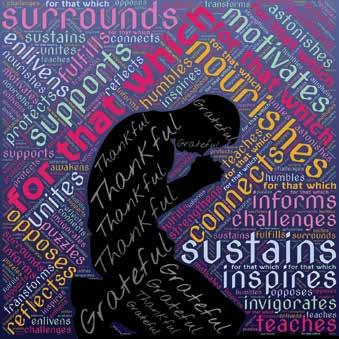
my new understanding of prayer into practice, I found my heart aching for their pain and cried out for the Lord to please just miraculously fix all of it, to take it away for them.
But He reminded me through reading His Word that that’s not always the best thing for us. Sometimes the trials we’re in are consequences of our own sin and we need to endure them. And sometimes God has designed the trial to sanctify us and glorify Himself. See Job.
“







‘My thoughts are not your thoughts, Nor are your ways, My ways,’ declares the LORD.
‘For as the heavens are higher than the earth, So are My ways higher than your ways And My thoughts than your thoughts.’” – Isaiah 55:8-9
Are you weary? Cry out to the Lord. Are you struggling? Ask Him for help. He will deliver you, but possibly not in the way you expect but in the way that is best – to train you in righteousness. For your good and for His glory. n
Bethany Riehl lives in the Treasure Valley with her husband, three kids, and one super chill dog. She writes articles and fictional novels when she can, and her one desire is to point others to the love and sufficiency of Jesus Christ. Her books can be found on Amazon or at your local library…after you request them to be in stock, of course.
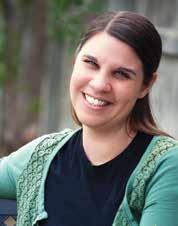
What are your thoughts about slang?
Yes, slang can be vulgar, but it’s certainly not limited to offensive language. “Vibe” is a great example. Vibe has become an appropriate term to communicate a positive feeling one may associate with an activity, experience, or person.
Over time, society may crown a word with a new definition. In fact, did you know “girl” was first used to describe a young child – male or female? Of course, today we know girl refers to a female. “Invest” is another example. If you asked a handful of people to define invest, they may sum the word up by saying “to sacrifice something of value now expecting to receive something of greater value in the future.” Though it’s a perfectly acceptable answer, the origins of the word have a different spin.
Invest was derived from the Latin word investire which translates – in ‘to’ vestire ‘clothe.’ As early as the 14th century, the definition of invest meant to clothe in the official robes of an office. Investing was about empowering somebody with their official uniform for a highly esteemed assignment.

Many of us are familiar with a vest being part of a suit. So, it makes sense there is some type of clothing connection. Let’s dive into some historic examples of investors.
Man as Investor. In June of 1953, with the summer heat around the corner, a very special service was taking place indoors. A coronation was being held for a 27-year-old girl in
London’s Westminster Abbey. During Queen Elizabeth II’s 3-hour coronation service, the Archbishop of Canterbury and his team dressed their leader in vestments. Queen Elizabeth II was clothed in the official robes of her new office to lead and rule the United Kingdom.
God as Investor. Isaiah 61:10 rejoices, “for He has clothed me with garments of salvation and arrayed me in a robe of His righteousness.” In the beginning, before the fall of man, “The Lord God took the man and put him in the garden of Eden to work it and keep it” (Genesis 2:15). God is an investor of His image bearers. Many of us have learned to think about God as our Father, Provider, and maybe even our Healer, but how many times have you thought about God as Investor? I’d venture to say few. However, Scripture reveals this beautiful story of creation where God places man and woman in His perfect creation as rulers.

Today, when we think about investing, we get excited about what we may get out of it – often, monetary return. As we reflect over its origins, investing was actually about empowering someone else, specifically for noble work.
Christians as Investors. At Christian Wealth Management, we enjoy sharing how investing in stocks is simply purchasing ownership in a business. Businesses have influence. They can add value by enabling humanity to flourish (think developing a cure for cancer) or extract value by profiting off their demise (think addiction – pornography, alcohol). Stock
“Arise, shine, for your light has come, and the glor y of the Lord has risen upon you. For behold, darkness shall cover the earth, and thick darkness the peoples; but the Lord will arise upon you, and his glor y will be seen upon you.”
Isaiah 60:1-2
Come join us in Jacksonville, Florida!
Register at : Conference .aglow.org


owners empower the companies they own in their portfolio by supplying capital to continue the work they are doing – good and bad. As we ponder its origins, may we consider investing in a new light – as a means to clothe companies with capital to go out and do good work.
As Christ followers, we are challenged to “do all for the glory of God” (1 Corinthians 10:31b). If this is our assignment, the question remains, what companies should we be clothing with capital?
Learning the slang of a community presents a unique opportunity to think about a word differently. As I wrap up this piece, I’m reminded of the Beach Boys’ tune with the words “good, good, good, good vibrations.” Huh, maybe that’s where vibe came from... n
Ryan De Amicis is an investment advisor with Christian Wealth Management in Boise, providing biblically responsible investment advice to Christians. For more information, visit investforthegloryofgod.com or contact him at ryan@christianwm.com or (408) 758-6413.
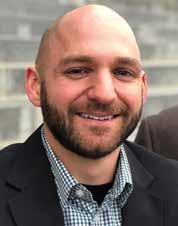
Investment advisory services provided by Creative Financial Designs, Inc. Securities are offered through CFD Investments, Inc., Member FINRA & SIPC, 2704 South Goyer Road, Kokomo, IN 46902, 795-453-9600. Christian Wealth Management, LLC is not affiliated with CFD Investments, Inc. or Creative Financial Designs, Inc
Presenters:
Robert L. Aldridge, Attorney David Durant, Director of Gi Planning
Hosted by : Majors omas & Kimberly Stambaugh

Tuesday, September 19, 2023 10:30 a.m. to 1:15 p.m.
e Salvation Army Boise C orps 9492 W Emerald St Boise, ID 83704

Information for Everyone!
■ Does a Will protect me and my family from Probate?

■ How might incapacity a ect me and my family?
■ What are the bene ts of a Living Trust?
■ How can I maximize the inheritance to my heirs?

■ How can I pass my values to future generations?
INVITE FAMILY & FRIENDS
RSVP - Seating is Limited.

No solicitations will be mad e. For more information or to reser ve your seat, please call or e-mail
(208) 994-4782
IDplanne dgiving@usw.salvationarmy.org
David Durant, ChFC® FC EP Director of Gift Planning

david.durant@usw salvationarmy.org
O ce: 503.794.3285
Toll Free: 800.481.3280
e Salvation Army Cascade Division | Ser ving Ore gon and Southern Idaho

The hope of a Christian is inseparable from his faith. Whoever believes in the Divine inspiration of the Holy Scriptures must hope that the religion of Jesus shall prevail throughout the earth. 1
America has enjoyed many accomplished political leaders, but few have exceeded the contributions of John Quincy Adams, the lawyer son of Founding Father John Adams. He served nearly seven decades as a diplomat, senator (state and U.S.), representative, Secretary of State and sixth president of the United States.
Born July 11, 1767, Adams grew up in Mas sachusetts. Educated by his parents and private tutors, the young Adams read and translated the works of Plutarch, Thucydides, and Aristotle. But young John also read the Bible annually, in different languages and translations, spending an hour daily in Scripture study and meditation. The Word of God, he once penned, was “his counsel and monitor through life.” 2
Adams authored a letter to his son in 1811, commending the habit of daily Bible reading, stating that “so great is my veneration for the Bible, and so strong my belief, that when duly read and meditated on, it is of all books in the world, that which contributes most to make men good, wise, and happy—that the earlier my children begin to read it, the more steadily the practice of reading it throughout their lives, the more... confident will be my hopes that they will prove useful citizens to their country, respectable members of soci ety, and a real blessing to their parents.” 3
John Quincy Adams was still a child when his intellect and political talent were pressed into service for a young nation. At 11, he accompanied his ambassador father to France, and later the Netherlands (1778), to learn the finer points of international relations. Three years later, living on his own, Adams served as a secretary for the American diplomat in Russia. Between 1785 and 1789, a teenaged Adams studied law at Harvard, eventually launching a legal career in Boston. Adams also became a prolific writer, publishing books, essays, articles, and letters.
In 1794, George Washington appointed Adams ambassador of the Netherlands, followed by Portugal (1796) and Prussia (1797-1801). He returned to the States in 1801 and was elected Massachusetts’s senator. During this time he also served as a professor of logic, rhetoric, and oratory for Brown and Harvard universities. In 1817, James Monroe drafted Adams as his Secretary of State.
John Quincy Adams was eventually elected America’s sixth president (1825-1829). After office, he became a U.S. House of Representative for Massachusetts for nine terms (1831-1848). It was the first and last time (to date) a U.S. President retired to a lower national office.
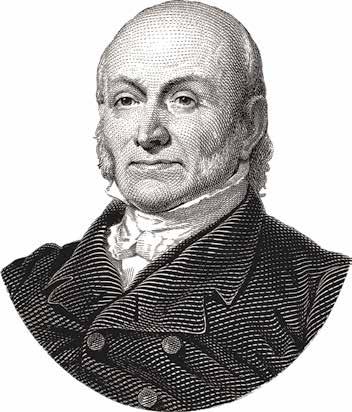
But that’s because John Quincy Adams still had a fight to finish. And he literally died on the job attacking the evil of his age: slavery. An ardent and outspoken abolitionist, Adams was nicknamed “The Hell-Hound of Slavery.” His political adversaries did all they could to silence his barking. But nothing stopped him from arguing, with persuasive eloquence, against the slavery institution in America. He was the first to pitch a constitutional amendment to abolish it.
In 1841, Adams and Francis Scott Key helped liberate 53 enslaved Africans charged with mutiny on the La Amistad, a Spanish slave ship. Adams gave a nine-hour defense for these slaves before the U.S. Supreme Court (at 73 years of age). In his rants against human bondage, he often pointed to the true root cause of the slave trade: Islam. For over a thousand years, Muslim slave markets captured, transported, and sold 180 million African slaves, shipping them all over
Adam argued that Islam fundamentally hated the Christian religion (which preached liberty, equality, and justice). Consequently, it used terrorism, fear, and human slavery to keep Christian nations disrupted and divided. In his 1827 “Essay on Turks” Adams opined: “Such is the spirit, which governs the hearts of men, to whom treachery and violence are taught as principles of religion.”
In November 1846, John Quincy suffered a stroke that left him partially paralyzed. But it’s hard to keep a good man down. Adams fully recovered and returned to the House floor within a few months. A year later, on February 21, 1848, during a House vote, Adams (also known as “The Old Man Eloquent”) collapsed at his seat. Forty eight hours later he was dead. His reported final words: “This is the last of Earth. I am content.”
Word of Adams’s death spread quickly, thanks to the newly invented telegraph. This created a national mourning unknown before in America (death notices traveled much slower in those days). Adams’s funeral featured a processional of military units, senators and representatives, Supreme Court justices, President James Polk and his cabinet. Surprisingly, among his pallbearers were political opponents and senators John Calhoun (D-SC) and Thomas Hart Benton (D-MO). Calhoun was a slave owner, while Benton was a notorious political adversary.
Yet also among his pallbearers was a new congressman from Illinois: Abraham Lincoln.
A dozen years later, Lincoln would become president over our divided nation and fulfill the “Hell-hound of Slavery’s” lifelong dream to eradicate slavery in America.
To his dying day, Adams proclaimed his Christianity and affection for the Bible. He concluded: “In what light soever we regard it, whether with reference to revelation, to literature, to history, or to morality—[the Bible] is an invaluable and inexhaustible mine of knowledge and virtue.” 4
John Quincy Adams. Ambassador. Congressman. Senator. President. Abolitionist. Christian.

Now you know the rest of HIStory. n
Dr. Rick Chromey helps people interpret history, navigate culture, and explore faith. He’s an author, historian, professor, and founder/president of MANNA! Educational Services International. Rick and his wife Linda live in Star, ID. Rick is currently booking speaking dates to inspire and equip leaders, teachers, parents, and pastoral staff. Readers are also invited to subscribe to the inspirational and educational Morning MANNA! (M-F) email. For more information, please visit: www.mannasolutions.org.

Source:
1) Life of John Quincy Adams, W. H. Seward, editor (Auburn, NY: Derby, Miller & Company, 1856), p. 249.
2) Letters of John Quincy Adams to His Son on the Bible and Its Teachings (Auburn, NY: Derby, Miller & Company, 1848), 7.
3) Ibid., 9-10.
4) Ibid., 20














Groceries from Over 15+ Countries: Germany, Italy, Poland, Israel, Turkey, Romania, France, Sri Lanka, Bulgaria, Croatia, Bosnia, Slovenia, Hungary, Russia, Ukraine, Moldova, Belarus & more






The benefits of green juice are numerous. First off, it is a great source of vitamins and minerals, both of which are necessary for optimum health. The green fruits and vegetables that are frequently used in green juice recipes are high in potassium, calcium, iron, and the vitamins A, C, and K. These vitamins and minerals are crucial for promoting bone health, immunological function, and general vigor.
Antioxidants, which guard the body against cellular harm and inflammation, are also abundant in green juice. This is significant because autoimmune illnesses, cancer, and heart disease are just a few of the conditions that have been related to chronic inflammation. You can lessen inflammation in the body and improve general health by ingesting green juice. To do a green juice fast, you will need a juicer and a variety of fresh fruits and vegetables. Here are the steps to follow:
1. Choose your ingredients: Select a variety of leafy greens, such as kale, spinach, and chard, as well as other green vegetables, such as cucumbers, celery, and broccoli. You can also add fruits such as apples, pears, and lemons to add sweetness and flavor.
2. Juice your ingredients: Use a juicer to extract the juice from your fruits and vegetables. Be sure to remove any seeds, stems, or tough skins before juicing.
3. Drink your juice: Drink your green juice immediately after juicing to get the most nutritional benefit.
4. Repeat for several days: fast, repeat the juicing process for several days, consuming only green juice and water. It’s im portant to talk to your doctor before starting a juice fast to ensure it is safe for you.


A green juice fast can be a great way to detoxify your body and give your digestive system a break. However, it’s important to remember that it’s not a long-term solution for weight loss or overall health. It’s always best to incor porate a variety of whole, nutrient-dense foods into your diet for optimal health. The best juicer for you will depend on your personal preferences, juicing needs, and budget. There are several types of juicers available on the market, each with its pros and cons. Here are some popular types of juicers:
1. Centrifugal Juicers: These juicers are fast and affordable, but they can be noisy and may not be as effective at extracting juice from leafy greens.
2. Masticating Juicers: These juicers are slower and more expensive than centrifugal juicers, but they are better at extracting juice from leafy greens and produce a higher yield of juice.
3. Citrus Juicers: These juicers are specifically designed to juice citrus fruits like oranges and lemons. They are affordable and easy to use but are limited in their versatility.
4. Twin Gear Juicers: These juicers are the most expensive and efficient type of juicer. They use two gears to crush fruits and vegetables and extract juice. They can handle a wide variety of produce, including leafy greens and wheatgrass, but they are also the slowest and most time-consuming type of juicer.
When choosing a juicer, consider your budget, the types of produce you plan to juice, and your lifestyle. For example, if you are looking for a quick and easy way to make fresh orange juice in the morning, a citrus juicer may be the best choice for you. However, if you are looking to juice a wide variety of produce and want to get the most nutritional benefit from your juice, a masticating or twin gear juicer may be the best choice. n
If you have questions or need more information, text Rosie Main at (208) 859-6170 or email her at rjmaindc@yahoo.com.
1 Tbsp fresh grated (or juiced) turmeric and ginger
1-2 Tbsp fresh squeezed lemon juice
Pinch of cayenne pepper (optional)

Directions: Blend all ingredients and mix well. Shoot back on empty stomach.


6-8 kale leaves (or 2 cups of spinach)
1 cucumber
4 celery stalks


2 green apples
1/2 lemon, peeled
1-inch piece of fresh root ginger
Directions: If you do not have a juicer, seek out a similar blend of ingredients in a raw, cold-pressed organic juice from the health food store. You can also use a green powder mixed with water.




1 small beet, topped, rinsed and peeled
5-6 medium or large carrots
1 small or medium green apple
1-inch piece of fresh root ginger
Directions: If you do not have a juicer, seek out a similar blend of ingredients in a raw, coldpressed organic juice from the health food store. You can also use a red powder mixed with water.

Before Power Point there was flannelgraph. If you grew up in Sunday School like I did, then you might know what I’m talking about although I’m dating myself here. There was a large piece of cardboard covered with flannel and then the teacher would place Bible characters and props on the board that seemed to magically stay in place as she told the story. There was such suspense waiting on the next piece to be placed on the board as the story unfolded! Long before Veggie Tales, this was how kids visualized and connected with the great stories of the Bible, and it’s where I first remember hearing the story of Shadrach, Meshach, and Abednego or the Three Hebrew Children in the Fiery Furnace.
You’re probably familiar with how the story goes. The three Hebrew youths were part of thousands of Jews who had been taken captive to Babylon after the conquest of Jerusalem by the Babylonian army. Those who were bright and good-looking were made to serve as eunuchs in the palace. Their Hebrew names that paid tribute to Elohim and Yah the God of Israel were replaced with Babylonian names to reflect the gods of Babylon. And thus, Shadrach, Meshach and Abednego are introduced into the Old Testament narrative.
Against our protagonists stands King Nebuchadnezzar. Nebuchadnezzar was not only king of Babylon but the greatest ruler in the Chaldean dynasty, having conquered the Assyrian Empire making Babylon the dominant power in the Near East. He built the renowned Ishtar Gate and the Hanging Gardens of Babylon that were one of the Seven Wonders of the Ancient World. There was nothing this guy couldn’t do, and he was full of the favor of the gods and himself.
Daniel, a peer of Shadrach, Meshach and Abednego, had interpreted a dream for Nebuchadnezzar of a giant image made of gold, silver, brass, and iron mixed with clay. Babylon was the head of gold with succeeding empires representing the other elements until a giant rock came and smashed the statue to pieces. Nebuchadnezzar apparently forgot about the
huge boulder part of the dream and decided to build a massive golden statue of himself and commanded the citizens of Babylon to prostrate before it and worship him. As an incentive, he built a giant fiery furnace and decreed that those who would not bow down would be burned to death. (Nazi Germany anyone? Those who do not bow to the god-state will be burned in ovens?)
At the grand ceremony of the king’s colossal ego, the signal is given to bow down and worship the statue, and only Shadrach, Meshach and Abednego remain standing in defiance to the king’s decree. When they are arrested and brought before the monarch, he explodes in narcissistic rage and threatens to throw them in the fiery furnace. The response from the three young men is legendary. “We will not bow. We will not worship your image. Our God will save us ...
“But if not, let it be known to you, O king, that we do not serve your gods, nor will we worship the gold image which you have set up.” (Daniel 3:18)
But. If. Not. But if our God does not save us from the fiery furnace, but if our God does not deliver us from your hand, we will not worship your gods or bow to your image.

Now flash forward to the New Testament scene at the cross where a jeering mob is mocking the Crucified Savior. “If you are the Son of God, come down from the cross!” (Matthew 27:40) How could He be the Messiah? The Messiah was supposed to restore Israel, which meant first and foremost throwing off the Roman yoke of occupation and tribute. This Guy ate with tribute collectors and conversed with centurions. And now He’s being publicly executed by the very people that He was supposed to conquer! He can’t even save Himself much less Israel. He’s not my Messiah.
The great IF is one of the oldest strategies of our adversary. When he tempted Christ for forty days in the wilderness, he demanded of Him: “If you are the Son of God, command that these stones be made bread.” “If you are the Son of God, throw yourself down from the top of the Temple …”
And then he used Scripture: “For it is written that His angels will bear You up unless You should dash Your foot on a stone.” (Luke 4:1-10)
Do we hear the same things now? “If He is the Son of God, let Him give you money, for as it is written: ‘wealth and riches will be in his house.’” “If He is the Son of God, let Him give you this promotion that you’ve been longing for; for as it is written: ‘whatsoever he doeth shall prosper.’” “If He is the Son of God, let Him save my child from cancer, for as it is written: ‘He heals all your diseases.’” “If He is the Son of God, let Him make me healthy and happy, for as it is written: ‘length of days, long life and peace, shall they add to thee.’”
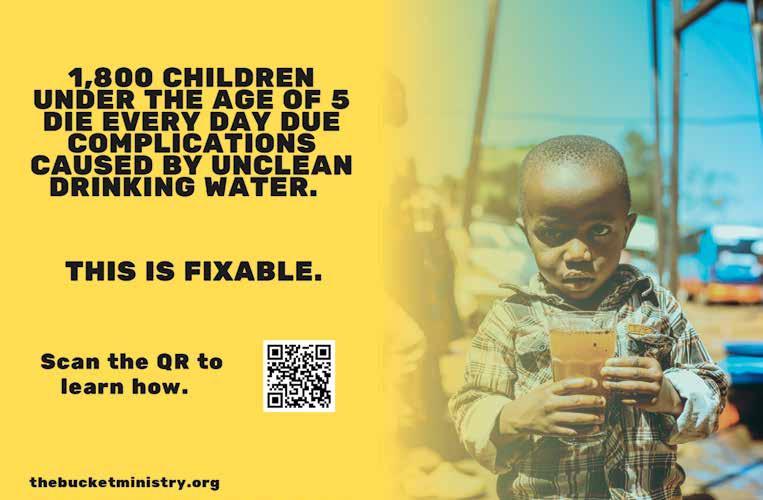
We buy into this logic and find ourselves standing at the foot of the cross looking up at a bloodied Man, mangled beyond recognition, and asking: “If You be the Son of God, ________ [fill in the blank].” Change my circumstances. Give me this. Make me happy. If You are indeed Who You say You are. If not, then You are not the Messiah for me. If You can’t save me from my situation, then You’re not much of a Savior, are You?

Ah, the great “IF”!
If God always came through for us exactly when we asked, how we asked, with what we asked for, there wouldn’t be
much faith involved. We would be self-entitled, spoiled brats so far removed from the maturity of Job, the Jews in captivity and the faith of the Apostles. God does not always meet our expectations. And IF we demand that God does meet our expectations, we are guilty of idolatry. Like Babylon that was built near the old ruins of the Tower of Babel, we are making God in our image and in our likeness according to our whims and our desires rather than being transformed and conformed to His image and His likeness Who took on the form of a servant, not using His Godhood to His advantage, making Himself of no reputation, despising the shame, and enduring the cross.
Let me conclude. We have to flip the great “IF” on our adversary, and declare: “But IF not …” That is the blank that we have to fill in. And how we fill in that blank in times of adversity will show the measure of our faith in an unseen God. Can we trust God in the worst of times? If we believe, we will find ourselves standing with our larger than life heroes in the plain of Dura or next to an ash heap in the Land of Uz or in a crowded coliseum in Rome or perhaps in a quiet garden next to an olive tree praying, “Nevertheless (but if not), not my will, Father, but Your will be done.” n
The Bible has a lot to say about the role and responsibilities of a pastor. But do you know who it doesn’t mention? The pastor’s wife. Interestingly, it’s her role and responsibilities that consume the interest of many people in the church. As I said in my book, “What Would the Pastor’s Wife Say?”, marrying a pastor is a lot like marrying royalty – without the money and designer wardrobe. In other words, it comes with a variety of expectations.
I’m sure you remember Meghan Markle. This confident, savvy woman faced the expectations for her life as a royal with equanimity. Yet, in less than two years after she married, she folded her tent and stole away. She realized that for all the glamor of the lavish lifestyle it was an atmosphere in which she could not survive. Interestingly she also realized that her gifts were not appreciated by the royals and felt that she was not being allowed to be herself and thrive.
Many pastors’ wives feel exactly this same way – trapped by preset expectations. Consider a new pastor’s wife. She is usually young, inexperienced in handling groups of people, probably uncomfortable with the spotlight, and rarely old enough to be a spiritual leader. You can see you have a recipe for disaster. These women fell in love with a man and envisioned a fulfilling life working together for God’s kingdom and upon arriving at a church are faced with a reality that crushes them. Moving to a new church can feel to a pastor’s wife like inheriting dozens of new parents. People watching her every move, analyzing and passing judgment on them.
It is interesting that out of our prejudice, misunderstanding and laziness we have created an expectation for our pastor’s wife’s position in the church that burdens her. Why do we assume she is different than us, when in fact, the biblical expectations for her are exactly the same for every woman. Titus 2:4-5: That they may teach the young women to be sober, to love their husbands, to love their children, to be discreet, chaste, keepers at home, good, obedient to their own husbands, that the word of God be not blasphemed.
• To seek godliness
• To train younger women
• To be a good wife and mother
• To exercise the ministry gift God bestowed on her
I theorize that we expect so much of our pastor’s wife out of convenience. All those pesky chores none of us want to do: fillin as temporary Sunday school teacher, the one who will make sure the kitchen is spotless, the dogsbody if you will. The fact is, church boards and people can be bullies.
To justify our behavior we may believe that she is called to ministry because her husband has a call. While I know of very few women married to pastors who are not willing to walk alongside their husband and help his ministry, it remains that she does not have a call simply because he does. Her call may be a different one bestowed on her by God.
A few areas that you might examine and change if necessary are:
• The pastor’s wife is not the church answering machine. Call the pastor’s cell or the church secretary to leave messages.
If you need answers about times and schedules, consult the church website or Sunday bulletin.
• Don’t see her as a compulsory set of hands but as a friend you’d like to get to know.
• Give her time to acclimate to your church. A move is hard on everyone, especially children, and she needs to expend her energy on her family first.

• If the pastor’s family lives in church housing, it is their home. Do not walk in unannounced.
• Understand that her responsibility to the Body is the same as yours: to contribute to it with her gifts, not rescue or run it. n
Janice Hildreth is an Idaho native, retired pastor’s wife, and author. She is the author of two Q&A books and the first four books of a seven-part inspirational romance series set in the Pacific Northwest. You can purchase her books on Amazon. She has ministered to pastors’ wives for over two decades with her blog PastorsWife.com. She retired from the Idaho Statesman after 20 years. She and her husband live in Emmett, Idaho and enjoy every minute they get to spend with family, especially the grandchildren.
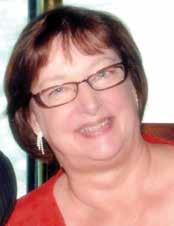
Ever been hungry? I mean, really hungry? Stomach-rumbling hungry? You know what doesn’t help at all when you’re hungry? Talking about food.
The idea of food does nothing to satisfy your hunger. Thinking about food and talking about it (or, say, binging episodes of “The Great British Baking Show”) really just makes it worse.
So what does help? Pretty obvious, right? The way to stop your hunger is … to just eat something.

In John’s Gospel, chapter 6, Jesus’ ministry is starting to gain traction and His teachings – and especially His miracles – are getting attention. Suddenly He has lots of new fans.

At the beginning of the chapter, He’s just miraculously fed the 5,000 and now people have begun following Him everywhere. Asking Him for more signs and wonders: “More bread, please!”
Jesus said to them, “I am the bread of life; whoever comes to me shall not hunger, and whoever believes in me shall never thirst” (John 6:32 ESV). Jesus’ fans were asking for more miracles, more free lunch, but what Jesus tells them is, “No, what you need is ME.”
I believe that we are all hardwired with a deep need for relationship with God; that we all experience a kind of hunger that can only be satisfied by the Bread of Life. With this deep instinct at work in us, we look for fulfillment in all of the obvious places: material possessions, entertainment, relationships, physical pleasure, spiritual en-
lightenment, etc. Many of us spend our entire lives working our way through an exhaustive but largely unconscious list in the search for what’s missing.
C.S. Lewis wisely observed that, “Human history is the long, terrible story of man trying to find something other than God which will make him happy.”
When Jesus says that He’s the Bread of Life, He’s telling us that all of the hunger that we experience as human beings – all of our need and desire and longing – find ultimate fulfillment only in Him. Jesus was never interested in making fans. Followers, yes. Disciples, certainly. But not admirers who stand at a distance and applaud. How many of us have spent years talking and thinking about the Bread of Life – all the while failing to really partake?
Remember: the idea of food does nothing to satisfy your hunger. Talking about Jesus, singing about Him, reading magazine articles about Him –these things are all well and good. But they are no substitute for partaking of a relationship with Him. n


Scott Riggan is a singer/songwriter from Emmett, Idaho. His brand-new collection of songs is called Bright Hope. To find out more and to hear his music, visit www.scottriggan.com or use the QR code here.









